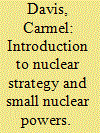| Srl | Item |
| 1 |
ID:
087661


|
|
|
|
|
| Publication |
2009.
|
| Summary/Abstract |
Why a combatant command for Africa? I argue that AFRICOM was formed to implement the U.S. national security strategy that seeks to strengthen states and eliminate ungoverned space, as well as establish relationships with African states that offer a means to greater state stability and foster economic development. In so doing, it counters global jihadist by denying them haven among weak governments or in ungoverned areas. It protects U.S. interests in resources by helping governments become more stable. And it competes with the Chinese approach that could worsen the status quo of ineffective states and ungoverned space. Indeed, the U.S. approach of increasing state effectiveness makes African countries less susceptible to the problems that may arise from the Chinese approach and so serves China's interests in access to natural resources.
|
|
|
|
|
|
|
|
|
|
|
|
|
|
|
|
| 2 |
ID:
087143


|
|
|
|
|
| Publication |
2009.
|
| Summary/Abstract |
This article analyzes the kinds of nuclear duels in which small nuclear powers might engage. It does so by articulating a deductive framework that describes the five ways force can be used. Nuclear weapons are means of force that can be used actively or passively to preserve or change the status quo and so can be used to support the resulting generic strategies of deterrence, defense, offense, and active and passive compellence. These are the politically purposive strategies available to conduct a nuclear duel. It then considers these strategies from the perspective of small nuclear powers by considering a case. Use of a single case makes for a more rigorous analysis of the relationship between strategies by forcing consideration of tradeoffs and complementarities. The awkwardness of the real world inherent in a single case cannot be sidestepped by use of convenient examples from other situations. North Korea is used because it is the focus of negotiations to abandon its nuclear program. In contrast, India, Israel, and Pakistan are not under international pressure at this time, and Iran does not yet possess nuclear weapons. The result is an exploration of the nuclear duel involving small nuclear powers intended to illuminate for non-specialists the opportunities, constraints, and interconnections within the space of possible nuclear strategies.
|
|
|
|
|
|
|
|
|
|
|
|
|
|
|
|
| 3 |
ID:
155264


|
|
|
|
|
| Summary/Abstract |
The Islamic State has severe limits and poses a manageable problem. Its limits include that it is unable to occupy ordered areas or Shiite areas. The Islamic State’s military capability and its ability to govern territory are modest. It collaborates poorly with like-minded organizations and it has elicited a military response from countries, reducing its territory and imperiling its existence.
|
|
|
|
|
|
|
|
|
|
|
|
|
|
|
|